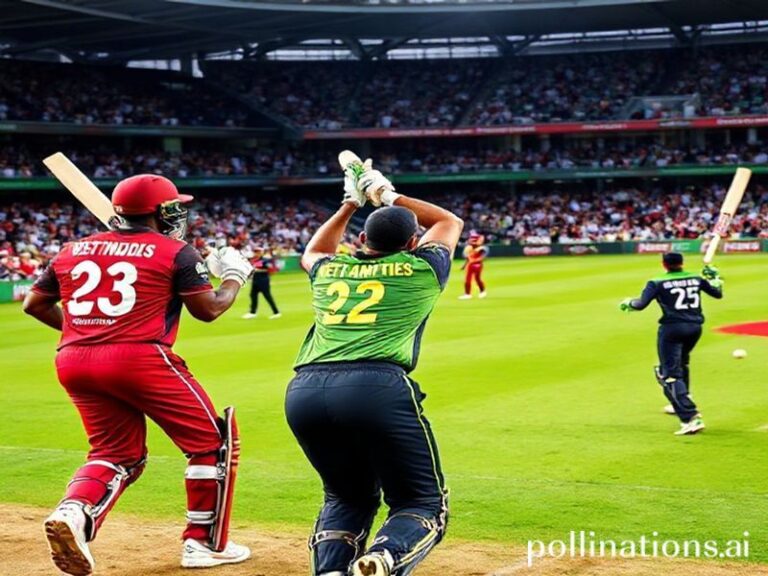Double Trouble Worldwide: How Twins Are Quietly Rewriting Global Economics, Espionage, and Existential Dread
Twins: The Original Global Supply Chain Glitch
By Our Man in the Field, nursing jet-lag and an espresso in Terminal 3
The planet now hosts roughly 1.6 million fresh pairs of twins a year—an annual cohort large enough to qualify as the world’s 153rd-largest country, somewhere between Eswatini and Fiji. That should worry the United Nations, because twins don’t respect borders, treaties, or HR onboarding forms. They arrive two-at-a-time with identical barcodes, rendering customs declarations almost poetic in their futility.
Consider the demographics: Africa leads the multiple-birth league (Nigeria tops the charts at 40 twin sets per 1,000 births), while Asia politely declines the honor, preferring its population growth à la carte rather than buy-one-get-one-free. Europe, ever the bureaucrat, keeps meticulous IVF registries so Brussels can subsidize the miracle with tax credits and mild existential dread. In the Americas, Brazil throws a Carnival-themed baby shower; Canada issues two SIN cards and apologizes for the paperwork.
Economically, twins are a hedge fund’s fever dream: double the diapers, but also double the future labor force. Goldman Sachs allegedly ran a Monte Carlo simulation titled “Twin Shock 2050,” which predicted a 0.3 % GDP bump in nations whose fertility clinics perfected embryo-splitting before the competition. The report was leaked by an intern who noted, between panic attacks, that the model assumed both twins would survive climate change, a heroic leap of optimism.
Technology, of course, is meddling. Iceland now stores frozen embryos next to its bitcoin mines; waste heat keeps the blastocysts cozy and the miners feeling vaguely procreative. Meanwhile, China’s Hebei province offers a “Two-for-One Belt and Road” package: implant two embryos, get a discounted shipping container of baby formula. Critics call it neo-eugenics; marketing calls it synergy.
The darker corners of geopolitics haven’t missed the angle. Intelligence agencies adore identical twins for passport fraud—one travels, the other takes the polygraph. During the last World Cup, Qatari security detained three sets of Colombian twins on suspicion of tag-team ticket scalping. They were released after proving they were actually triplets (the third siblings ran the cash app). In a world where facial-recognition cameras outnumber pigeons, a matching sibling is the closest thing to an invisibility cloak.
Culturally, twins serve as Rorschach tests for national anxieties. In the United States, they star in horror films where one is inevitably evil; Hollywood economics dictate that evil twins generate twice the streaming royalties. In India, festival calendars mark “Twin Day” in certain villages, where siblings are worshipped, then vigorously milked for Instagram content by visiting lifestyle influencers. Finland, true to form, hosts a silent retreat for adult twins seeking “individualized solitude,” which ends with everyone realizing they synchronized their breathing anyway.
Yet the broader significance may be metaphysical. Twins are living reminders that replication is cheaper than innovation—a lesson Silicon Valley took to heart long before biology caught up. Every pair is a cosmic joke about identity in the age of mass production: if two humans can share 100 % of their DNA and still argue over who ate the last spring roll, what hope do nation-states have of agreeing on carbon credits?
As borders ossify and supply chains convulse, twins keep slipping through—tiny diplomats without portfolio, smugglers of genetic déjà vu. They don’t just double the population; they double the absurdity. And in a world running low on everything except absurdity, that makes them our most renewable resource.
Conclusion: Next time you’re stuck in passport control behind a pair of toddlers wearing matching Mickey Mouse ears and expressions of conspiratorial glee, remember you’re not witnessing a family vacation. You’re watching a live demo of the universe’s favorite party trick—mass-producing humanity two units at a time, no refunds, terms and conditions subject to existential angst. Twins: proof that even biology has a sense of humor, and the punchline is us.







